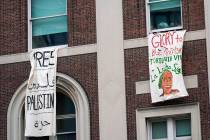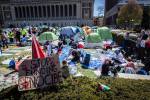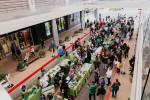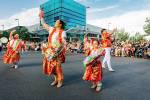Housing slump could have silver lining
Many Las Vegans are antsy. They don't sit still much. Rather than spending a quiet evening reading a novel, watching an old movie or putting together a 1,000-piece puzzle, they're on the run, racing from the fitness center to the restaurant to the casino. They always seem to have too many things to do and not enough time, an urgent need to go anywhere but home.
This, I think, is one reason we have trouble getting to know our neighbors in this town: We aren't home enough. Another reason: When we are home, many of us stay inside, partly to avoid the insufferable heat six months of the year, but also because we don't feel any particular connection to our homes or our neighborhoods.
In regard to our houses, many of us describe them as "investments" rather than "homes." This has always bothered me.
True, buying a house is a big financial commitment, the biggest for most people. But the general idea -- old-fashioned, perhaps -- is that your "house" is intended to eventually become your "home." It is not supposed to be temporary lodging while you wait for the real estate market to spike.
Yet, that old-fashioned idea is lost on many Las Vegans. Until very recently, it was not unusual for people here to live in a succession of houses over a short period of time.
"Welcome to the neighborhood," a neighbor says, greeting the new family on the block with a plate of cookies.
"Thanks," the restless newcomer says, quickly adding, "But we'll only be here for a year, then we're going to sell this house and pocket a nice profit."
So much for building a sense of community in Las Vegas.
This mentality, coupled with the large number of houses owned by out-of-town investors -- aka, rentals -- makes it tough to improve the quality of life here.
Of course, the Las Vegas real estate market has gone sour. Home values that skyrocketed during the 2004-05 boom are dropping. Mortgage foreclosures are rampant. More than 24,000 houses are for sale across the valley. Home builders have standing inventory, and a few have shut down construction sites.
This is not good for Las Vegas from an economic standpoint. But there's a silver lining.
If Las Vegans can't get a desirable price for their "investment," they are more likely to stay in one place for a while. And if they stay in one place, they are more likely to get comfortable in their homes and put down roots.
This is good for the neighborhoods, good for the schools and, ultimately, good for the community as a whole.
The longer people stay in a neighborhood, the more they care about it. They take more pride in their houses. They get to know their neighbors, which enhances public safety. They're more likely to give a hoot about the quality of the schools. They're more likely to vote and get involved with charity work.
It's understandable that many newcomers don't immediately commit to staying here for the long haul. Las Vegas isn't for everybody. People need to spend time here before deciding whether it's a place they want to put down roots.
And one reason some people don't instantly fall in love with Las Vegas is the lack of community. It's hard to get to know people here. Newcomers often feel alone, adrift, unwelcome.
The housing slump, as bad as it is for business, just might help us fix this problem.
My favorite book by the essayist Scott Russell Sanders is called "Staying Put: Making a Home in a Restless World." In it, Sanders describes his "attempt to fashion a life that is firmly grounded -- in household and community, in knowledge of place, in awareness of nature, and in contact with that source from which all things rise. I aspire to become an inhabitant, one who knows and honors the land."
Sanders notes that this goal runs counter to American trends: "My nation's history does not encourage me, or anyone, to belong somewhere with a full heart. A vagabond wind has been blowing here for a long while, and it grows stronger by the hour."
Las Vegas represents the epitome of this "vagabond wind." When the city came into being in 1905, it was a division point between two railroad destinations -- a stopping-off point en route to somewhere else.
For many, this remains true of the city today. The tourist-based economy only exacerbates the situation.
I, however, would like to make a case for, as Sanders says, "staying put." Jobs and other demands may take some of us away from Las Vegas, and that's fine. But for those who intend to stick around, let's make an effort to build a stronger sense of community.
That means, in part, taking down that for-sale sign and settling in where you live now. Make your house into a home. Plant a garden. Meet the neighbors. Explore your area by foot or bike. Pick up litter. Volunteer. Vote.
It's not easy. But maybe, just maybe, if we water these seeds of community, if we build neighborhoods full of cherished memories, we'll see more Las Vegans passing on their family homes to the next generation.
A home is for living a life, not betting on a windfall.
Geoff Schumacher (gschumacher@reviewjournal.com) is Stephens Media's director of community publications. He is the author of "Sun, Sin & Suburbia: An Essential History of Modern Las Vegas" and, coming in February, "Howard Hughes: Power, Paranoia & Palace Intrigue." His column appears Sunday.
GEOFF SCHUMACHERMORE COLUMNS























